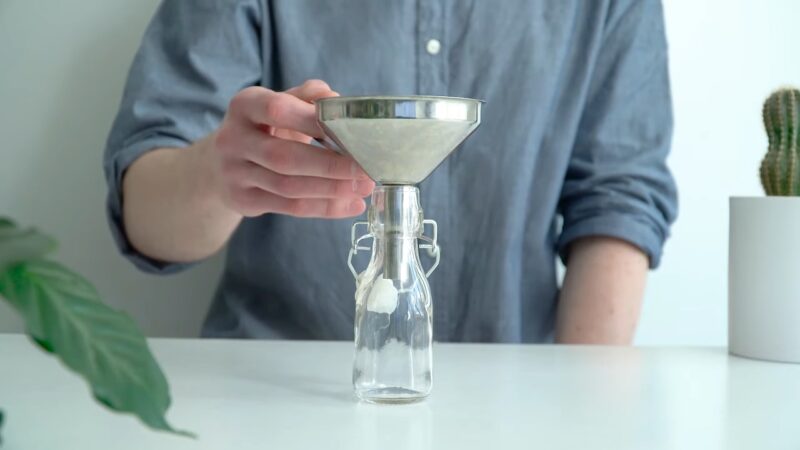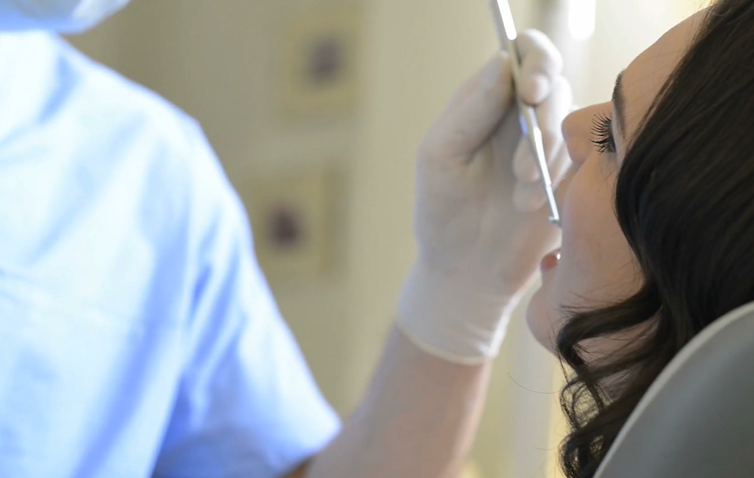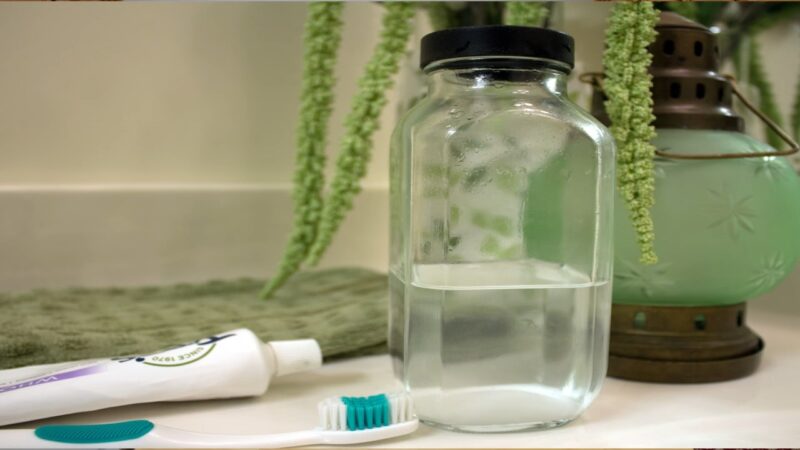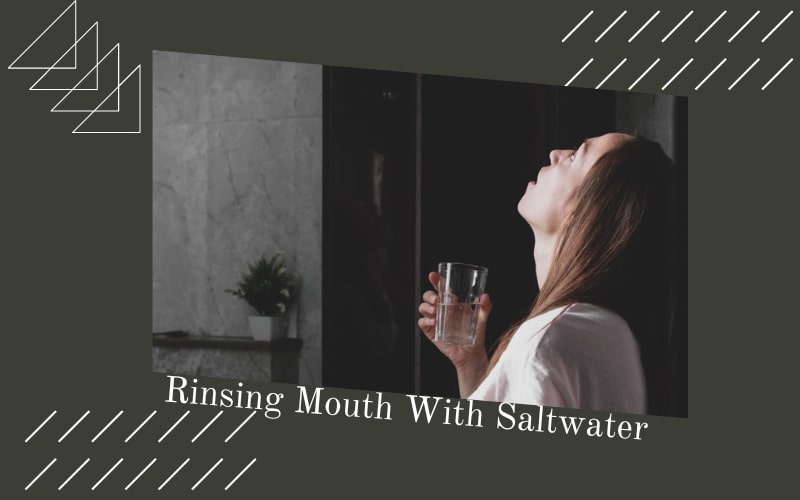If you want to wake up feeling refreshed and ready to start your day, you can do a few things before bed to ensure you get a good night’s sleep. One of those things is rinsing your mouth with salt water.
There are many benefits to rinsing your mouth with saltwater before bed. Salt is a natural disinfectant that can help kill bacteria in your mouth which can cause bad breath. Rinsing with salt water can also help reduce inflammation in your gums and throat and kill bacteria that causes plaque and tartar build-up on your teeth.
Salt water can also help remove food particles and debris from your mouth, leaving your teeth and gums feeling clean and refreshed. In this article, we’ll explore the science behind salt water rinses and how rinsing your mouth with saltwater before bed can improve your oral health.
Benefits of Rinsing Your Mouth with Saltwater Before Bed

It’s no secret that a good night’s sleep is important for your overall health and well-being. But did you know that rinsing your mouth with saltwater before bed can also be beneficial?
Saltwater has a variety of benefits for your health, including improving your oral hygiene. Let’s explore those benefits now.
- Rinsing with salt water or other solutions can help prevent cavities, bad breath, and gum disease by removing plaque.
- The minerals in salt dissolve in water to form a liquid solution that can be easily swished around the mouth. This process helps dislodge any built-up food particles between your teeth and gums so that they have no place to become trapped in the crevices of your teeth.
- If you have damaged teeth due to decay or excessive wearing down of enamel caused by grinding or bruxism (teeth grinding), rinsing with salt water can help repair them because it strengthens tooth enamel naturally.
- Rinsing can also help you avoid the pain of dry mouth, which may lead to sleep problems or even premature ageing or wrinkles on the face.
- Rinsing can also keep you from developing oral cancer or periodontal disease (gum disease).
- If you’re prone to dry mouth during the day due to medications or other factors such as hot weather or eating spicy foods that make it difficult for saliva production, then rinsing with salt water before bed will increase your salivary flow rate so that you won’t wake up with parched lips in the morning.
How to Make a Saltwater Rinse for Your Mouth

To make a saltwater rinse, simply add one teaspoon of salt to 1 cup of warm water and stir until the salt is dissolved. Then, swish the solution around in your mouth for 30 seconds to 1 minute, making sure to reach all areas of your teeth and gums. Spit the rinse out and then rinse your mouth with plain water afterward.
Saltwater rinses are safe for most people to use daily, but if you have cuts or open wounds in your mouth, you should avoid using salt water as it can irritate these areas.
How to Effectively Rinse Your Mouth with Salt Water

It’s important to know how much salt water you should use and how long you should rinse so that it does its job properly.
A pinch of salt in a cup or glass of warm water should be all it takes to effectively cleanse your mouth before bedtime, but if you have sensitive gums, consider cutting down on the amount of salt used, or try using a little bit more water.
You may find that rinsing with warm water alone is enough to remove food particles from your teeth, but some people find this uncomfortable, so adding just a pinch of coarse sea salt will make all the difference!
How long you should rinse for is subjective, but it’s generally recommended that you rinse for at least 30 seconds. As with many other health trends, the best thing to do is just to go with how you feel. If you don’t feel like rinsing any longer than that and your mouth feels clean after 30 seconds, then stop rinsing.
The best time to rinse your mouth is right before bed because you won’t have anything else competing for time while you’re brushing your teeth. You could also do it right after dinner if preferred and brush later. It’s usually recommended to brush and do saltwater rinsing at night if possible; however, we recommend starting with just one, so you don’t feel overwhelmed!
Other Things To Keep In Mind
- Do not swallow the salt water. The point of doing this is to rinse all of the bacteria out, so if you swallow it you’re just adding more bacteria back into your body, and too much saltwater might make you feel dehydrated.
- Do not rinse too much. Using too much can cause dehydration and can even lead to irritation.
Long-Term Health Benefits of Adding a Saltwater Rinse to Your Routine

There are many reasons to start saltwater rinsing as part of your daily routine. Saltwater rinsing can offer a number of long-term health benefits, including reducing the risk of gum disease, improving dental hygiene, and helping to prevent colds and sinus infections. Additionally, saltwater rinsing can also help to reduce stress levels and promote relaxation.
To sum it up:
- reduce the risk of developing throat and mouth infections
- reduce the risk of developing gum disease
- reduce the risk of developing cavities
- reduce tartar
- whitens teeth
- it helps to prevent colds and sinus infections
- reduces stress levels
- promotes relaxation
So if you’re looking for a way to improve your oral health, consider adding saltwater rinsing to your daily routine. You’ll be glad you did!
Drawbacks of Saltwater Rinses

A saltwater rinse is a popular oral health remedy that is used to treat several dental problems. However, there are a few negative aspects of saltwater rinse that should be considered before using it. Here are seven of them.
- Saltwater rinse can irritate the tissues in your mouth, throat, and oesophagus if done excessively.
- If you have a cut or sore in your mouth, saltwater can aggravate it and make it more painful.
- Saltwater can also dry out your mouth, which can lead to an increased risk of cavities.
- If you have allergies or sensitivities, saltwater can trigger an allergic reaction.
- There is a risk of over-diluting your body’s electrolytes.
- There is a small chance of accidentally swallowing salt water. That can be irritating to your mucous membranes.
- Finally, saltwater is not effective at killing bacteria or other organisms in your mouth. Therefore, it is not a good substitute for brushing and flossing your teeth.
Other Ways to Improve Your Oral Hygiene

There are some other things you can do to improve your oral hygiene, including:
- Using a soft toothbrush.
- Using fluoride toothpaste in moderation (don’t use too much, as this can damage the enamel on your teeth).
- Using a mouthwash at least once per day.
- Flossing daily (even if it seems annoying—it’s not just about getting food out of your teeth).
- Using a tongue scraper regularly (every day is good practice). Don’t use any other kind of metal for scraping off gunk from under your tongue; they will get sharp enough over time that they could damage mucous membranes in there and cause bleeding or infections! Also, don’t use string floss to scrape up extra gunk—the floss is too thick and won’t fit between the little crevices that need cleaning out well enough without hurting them.
FAQ
1. Why is saltwater considered a natural disinfectant?
Salt has been used for centuries as a natural disinfectant. When dissolved in water, salt releases ions that can disrupt the cell walls of bacteria, making it harder for them to survive and reproduce. This antibacterial property makes saltwater an effective mouth rinse.
2. Are there any alternatives to salt for mouth rinsing?
Yes, there are other natural alternatives like baking soda or diluted hydrogen peroxide. However, it’s essential to consult with a dentist before using any alternative solutions to ensure they’re safe and effective for your specific needs.
3. How often should I rinse with saltwater?
While the article suggests daily rinsing, it’s essential to listen to your body. If you experience any irritation or dryness, consider reducing the frequency. Always consult with a dental professional for personalized advice.
4. Can children use a saltwater rinse?
Yes, older children can use a saltwater rinse, but ensure they don’t swallow the solution. For younger children, it’s best to consult with a pediatric dentist before introducing any oral care routines.
5. Is there a specific type of salt that’s best for rinsing?
While the article mentions coarse sea salt, any non-iodized salt will work. Sea salt, Himalayan pink salt, or kosher salt are all suitable options. Avoid using iodized table salt as it may contain additives.
Wrapping Things Up
Rinsing your mouth with saltwater before bed is a simple and effective way to reduce bad breath. You can use it in your daily routine or when you’re travelling. It’s especially helpful during the winter season when colds and flu are common because these infections often give us an unpleasant taste in our mouths which may continue for several days after getting better.
The benefits of rinsing your mouth with saltwater before bed are undeniable. Not only can this practice lead to a better night’s rest, but it also helps regulate your salivary glands and boost oral health overall. If you’re looking for an easy way to improve the quality of your sleep and dental health, then this may be just what you’re after!

